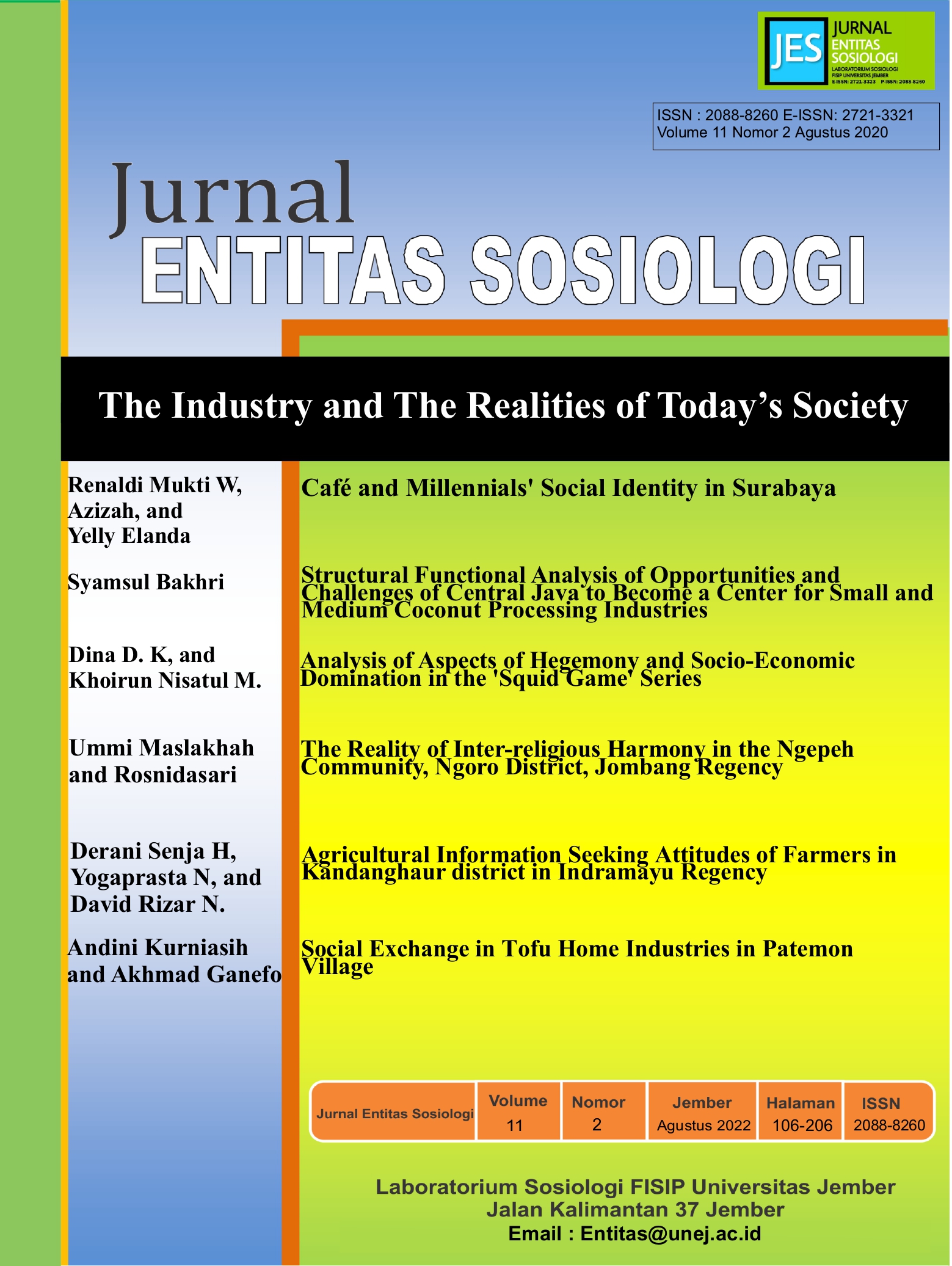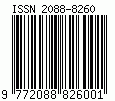Café dan Identitas Sosial Generasi Milineal di Surabaya
Abstract
This study examines the selection of cafes by the Surabaya millenniasl from a sociological point of view. Hanging out in a café is a lifestyle for the millennials and it reflects their social identity. This study aims to describe their choice over a cafe in Surabaya and how they form their social identity through the selection. The research method used is a qualitative method with a descriptive approach. This research was conducted in lower, middle and upper class cafes in Surabaya. The data collection technique used is non-participant observation and interviews with six informants. The results show that the backgrounds of the millennials in the selection of cafes in Surabaya are its unique atmosphere, cleanlines, cool air, fame, close distance from home. The atmosphere is the most important factor in choosing the cafe because it shapes the social identity of the millennials of Surabaya. They show their social identity through social media and their appearance. The millennial generation forms a social identity according to the image they want to show to others; to look populist, cool, successful and trustworthy.
References
Alvara. (2020). Indonesia Gen Z and Milineal Report 2020: The Battle of Our Generation.
Arisanti, P. (2021). Tren Gaya Hidup Milenial, Identitas Sosial dan Desain Coffe Shop. Jurnal Manajemen Bisnis, 18(4).
Emmanule, P. D. (2015). Rezim Pertumbuhan Kota Surabaya Studi tentang Pembangunan dan Revitalisasi Hotel di Surabaya. Jurnal Politik Muda, 4(1).
Fauzi, A., Punia, I. N., & Kamajaya, G. (2017). Budaya Nongkrong Anak Muda Di Kafe (Tinjauan Gaya Hidup Anak Muda Di Kota Denpasar). Jurnal Ilmiah Sosiologi (SOROT), 1(1).
IDN Research Institute. (n.d.). Indonesia Milineal Report 2019. 2019. Retrieved January 22, 2022, from https://cdn.idntimes.com/content-documents/indonesia-millennial-report-2019-by-idn-times.pdf
Kharisma, G. M. (2020). Konsepsi Hiperrealitas Menurut Jean Baudrillard Dalam Buku Simulations. Universitas Katolik Widya Mandala Surabaya.
Ma’sum, A., & Gunawan. (2019). Warung Kopi sebagai Ruang Ketiga bagi Pelajar SMA di Kecamatan Kragan Kabupaten Rembang. Solidarity, 8(1).
Mauludin, A. (2019). Urban Milineal: Analisis Kebijakan Tata Ruang Kota untuk Gen Y di Indonesia. . CIC Lembaga Riset Dan Konsultan Sosial.
Mustika Sukaresmi. (2019, May 22). 7 Perbedaan Warung Kopi (Kedai Kopi) dan Kafe (Coffee Shop). Ngopi Surabaya.
Mu’tashim, M. I., & Slamet, A. S. (2020). Pengaruh Kualitas Produk dan Kualitas Pelayanan terhadap Kepuasan Konsumen (Studi Kasus Pada Coffee Shop di Kota Bogor). Jurnal Manajemen Dan Organisasi, 10(2).
Pratiwi, W. R. (2022). Persepsi Anak Muda Di Surabaya Mengenai Coffee Shop Sebagai Gaya Hidup Masyarakat Perkotaan. Commercium, 5(2).
Santoso, L. (2017). Etnografi Warung Kopi: Politik Identitas Cangkrukan di Kota Surabaya dan Sidoarjo. Mozaik Humaniora, 17(1).
Suisa, K., Febrilia, V., & Santoso, T. (2014). Gaya Hidup Minum Kopi Konsumen Di The Coffee Bean & Tea Leaf Plasa Tunjungan Surabaya. Jurnal Hospitality Dan Manajemen Jasa, 2(2).
Suminto, A. M. (2018). Identitas Kelas dalam Desain Visual Warung Kopi di Surabaya. Jurnal Universitas Airlangga, 1–8.
Suryani, D. C., & Kristiyani, N. D. (2021). Studi Fenomenologi Pada Gaya Hidup Baru Anak Muda Sebagai Pengunjung Coffee Shop Di Kota Salatiga. Public Relations Journal, 1(2).
Swari, D. A. K. B. A., & Darma, G. S. (2019). Kepercayaan Lintas Generasi Dalam Penggunaan Social Media dan Electronic Word of Mouth. Jurnal Manajemen Bisnis, 16(4).
Wardah, M. R. (2019). Tren Kafe Sebagai Penanda Identitas Kelas Sosial (Studi Fenomenologi Masyarakat di Kota Makassar). Uin Alauddin Makassar.
Wijaya, A. G. (2017). Analisis Strategi Bersaing Dalam Persaingan Café Di Kota Malang (Studi Kasus Pada Vosco Coffee Malang). Jurnal Ilmiah Mahasiswa FEB, 5(2).
Yulianto, E. J. (2016). Studi Komparatif Identitas Nasional Pada Remaja Generasi Z Ditinjau Dari Intensitas Penggunaan Internet. Humanitas, 13(2).











